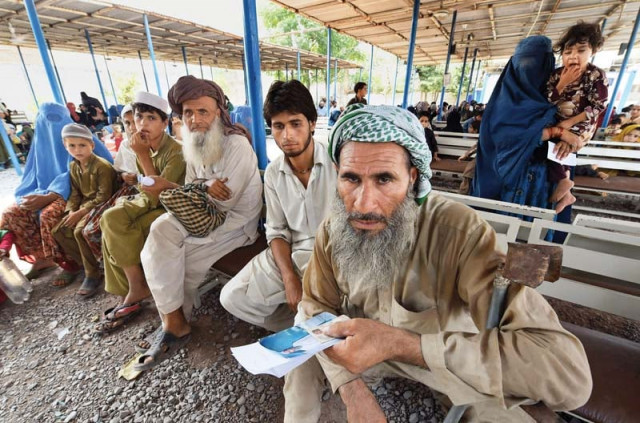Voluntary repatriation: Over 380,000 Afghans went back home in 2016, says UNHCR
Says process halted from December 1 for winter break

Afghan refugees wait to register at the United Nations High Commissioner for Refugees repatriation centre on the outskirts of Peshawar. PHOTO FILE
Fears of a crackdown on refugees in Pakistan along with a doubling of the UN’s cash grant for voluntary returnees to $400 saw a surge over the border after July this year, the UN has said.
“These are unprecedented numbers we did not anticipate. In October alone some 148,000 returned, which is the highest number of returns in one month since August 2005,” Duniya Aslam Khan, a UNHCR spokesman, said.
At one point UNHCR was processing an average of 5,500 refugees per day, she added. Estimates suggest that a further half a million unregistered refugees may also have returned this year, though the figure could not be verified by officials.
The returnees face an uncertain future in an Afghanistan still torn apart by decades of war, where a record half a million people were internally displaced by the fighting in 2016, according to UN figures.
The mass migrations are draining local resources, especially in safer urban areas, officials have said.
UNHCR said on Friday the voluntary repatriations will be halted from December 1 for a routine winter break, resuming in March. The break will also allow the agency time to mobilise additional resources, Khan said.
UNHCR had estimated just 50,000 refugees would return in 2016, based on trends from previous years. Khan said some 1.34 million registered refugees still reside in Pakistan. A further half a million undocumented refugees are also estimated to still be in the country, making Pakistan one of the largest refugee-hosting nations in the world.
The federal government has extended a deadline for the refugees to leave its territory from March 2017 to December next year. Some Afghan refugees have been sheltering in Pakistan for decades, first fleeing over the border after the Soviet invasion of 1979.
Some 4.2 million Afghan refugees have returned to Afghanistan voluntarily under the UNHCR-funded Voluntary Repatriation programme since 2002.
Published in The Express Tribune, December 3rd, 2016.



















COMMENTS
Comments are moderated and generally will be posted if they are on-topic and not abusive.
For more information, please see our Comments FAQ